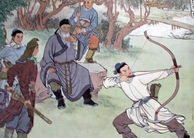|
Articles by Alexander E. Hopkins
Found 14 articles
2015, Vol. 7 No. 10
While some believe that scientists should communicate their research apolitically in research journals, others believe that scientists should communicate to the media in order to bring awareness to their research topic. As a compromise to these... Read Article »
2015, Vol. 7 No. 09
Public relations is a growing field in the United States (Botan, 1992, p. 149). This growth can be partially explained by the fact that public relations is an exercise in power (Curtin & Gaither, 2007, p. 235; Walker, 2006, p. 401). Throughout... Read Article »
2015, Vol. 7 No. 09
Since its introduction by German-born Political Scientist Elizabeth Noelle-Neumann in 1974, the Spiral of Silence theory has become one of the most-researched communication theories that explains public opinion formation in a media environment (... Read Article »
2015, Vol. 7 No. 04
The beginning of any social relationship is often ambiguous (Edelmann, 1985, p. 195). If a social interaction proves to be troublesome, conflict may occur. While conflict is an inevitable facet of life, it is not necessarily a negative phenomenon... Read Article »
2015, Vol. 7 No. 03
When politicians attempt to communicate their views in the public forum, the practice can be seen as a perquisite of the democratic process. This can prove to be an ideal environment for public relations, as the industry can identify and clarify... Read Article »
2013, Vol. 5 No. 06
Each year, thousands of colleges and universities across the United States hold commencement. This is a time when campus is in full bloom—manicured lawns, farewell hugs from classmates, and final exams. As the graduates march in unison to... Read Article »
2013, Vol. 5 No. 04
When U.S. President Ronald Reagan left office in 1989, he enjoyed a reputation as one of the most rhetorically dynamic Presidents of the twentieth century. His remarkable speaking ability was not surprising because, before his transition into politics... Read Article »
2013, Vol. 5 No. 01
Since the United States Constitution was ratified in the late-18th century, the question of state judge selection has been an important topic in legal theory. Since 1976, it has been one of the most widely debated issues in law school journals throughout... Read Article »
2012, Vol. 4 No. 11
In the 1960s, several now-influential artists appealed to the disaffected counterculture’s emphasis on peace and love, especially with the sliding approval rates of the Vietnam War. As public approval of the Vietnam War dwindled in the latter... Read Article »
2012, Vol. 4 No. 10
On October 26, 2001, President George W. Bush signed the USA PATRIOT Act in response to the September 11, 2001 terrorist attacks. The Act, by Congress just six weeks after the attacks with virtually no public debate, greatly-expanded the executive... Read Article »
2012, Vol. 4 No. 10
Since his death in 1142 CE, Yue Fei of the Song Dynasty (960-1279) has been revered by the Chinese as a national hero. His skill as a military leader, bravery in battle, and Chinese national pride have made him one of the most popular figures in... Read Article »
2012, Vol. 4 No. 09
Upon Apple CEO Steve Jobs’ death in October 2011, he was mourned worldwide as an innovator who changed the landscape of the computing world. Ironically, Jobs rarely created technological-breakthroughs in computing by working hands-on with... Read Article »
2012, Vol. 4 No. 09
Although he left office in March 1990, dictator Augusto Pinochet effectively held absolute power in Chile from 1973-1988. His September 1973 military coup proved that a charismatic individual could set the goals of the state by using hard power... Read Article »
2012, Vol. 4 No. 09
In the March-April 2012 issue of the Western Journal of Communication, a piece appeared by University of California-Santa Barbara (UCSB) Communications doctoral candidate Amanda Denes entitled “Pillow Talk: Exploring Disclosures After Sexual... Read Article »
Expedited Article Review
Submit an article and get a decision fast.
If you need a fast decision, INQUIRIES Journal offers expedited processing of your submission for a small fee. Depending on the expedited review option you choose, you can receive a decision in as few as 5-days.
In addition to a shorter review period, the fee supports the journal's continued operation and open-access publishing model. Standard submissions are always free. Submit Now » - Submit an Article to Inquiries Journal -
|







